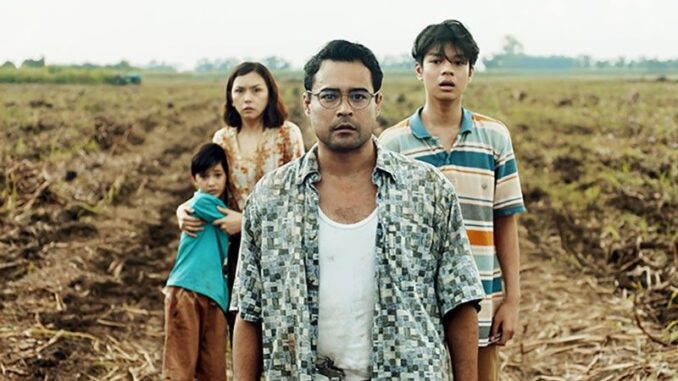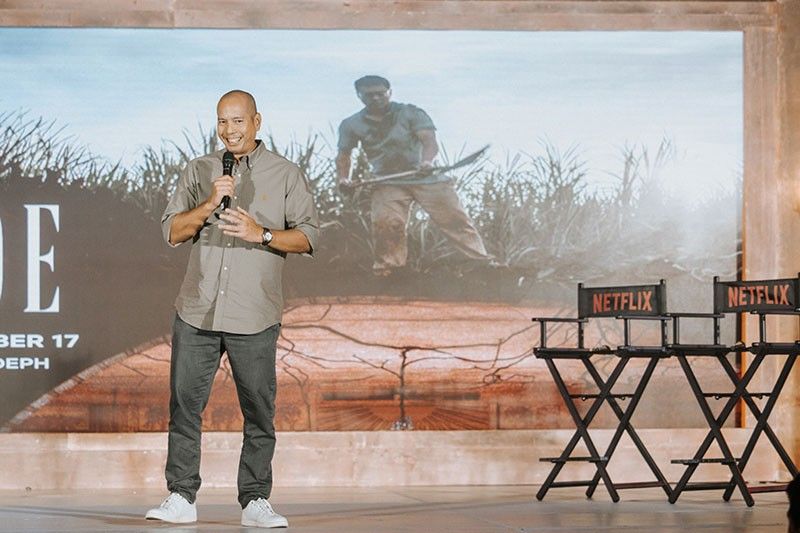
MANILA, Philippines — Is Netflix Philippines’ first-ever zombie film “Outside” worth the hype?
Beyond the blood, guts and flesh-eating “dead ones,” Carlo Ledesma’s “Outside” is a “truly Filipino” family drama that shines a light on generational trauma.
As of writing, “Outside” is the No. 1 film among the platform’s Pinoy subscribers. This post-apocalyptic psychological thriller follows a family of four — Francis Abel (Sid Lucero), his wife Iris (Beauty Gonzalez), and their two children, Joshua (Marco Masa) and Lucas (Aiden Tyler Patdu) — taking refuge in the Abel ancestral home in the province amid a deadly outbreak. But as the story unfolds, it becomes clear the dark secrets and unresolved traumas within the barricaded doors and shuttered windows of the house pose a far greater danger than the “dead ones” lurking outside.
The STAR recently met the cast and director during the media dialogue and in separate one-on-one interviews after the main press event. The Filipino-Australian filmmaker, whose previous horror works were “Sunod” and “The Tunnel,” initially set the story in Australia before relocating it to the country’s sugar capital, Negros Occidental, which happens to be his home province.
“It’s really a Filipino film. I know it started out as a story set in Australia, but I can really say, from the bottom of my heart, that this is ultimately, a truly Filipino film. Why? Because the fact that we set it in this very landscape of sugarcane fields, in this particular farm, you can’t get it anywhere else in the world,” direk Carlo said.
Indeed, without needing to name the location in the film, the sugarcane fields and even that detail of Francis teaching his son how to eat sugarcane provide clues about the setting. While the dense, towering stalks added to that visual sense of foreboding and isolation, shrouding dormant threats that could emerge at any moment.
Director Carlo Ledesma (rightmost) poses with the stars of ‘Outside,’ namely, Sid, Marco and Beauty at the advanced screening and dialogue for Netflix’s first zombie flick.
“I’ve always dreamed of shooting in my home province. When this opportunity came up, I said, let’s try that. What made it special was because the communities of the province really came to us. For them, it was a big event. They were loving Marco, Beauty and Sid,” he recalled.
Zombies, on the other hand, were portrayed by local actors from Bacolod, Kabankalan and other Negrense theater groups. “I’m proud because I was able to shine a light on my home province, and it was the first-time movie for many of them as actors.”
The production also tapped local designers to help build the world of “Outside.” One crucial location in the film is the ancestral Abel home. “Sabi ko, we need to find the house, and it needs to be an ancestral home. It needs to be big, it needs to give the sense that, okay, this family was once wealthy, but not anymore… that this family comes from a certain wealth, but when we see the house, it’s clearly (dilapidated). That’s very important in establishing the history of the characters. We were lucky to find an old house in the city of Ilog that fit,” the director shared.
Beyond these familiar elements, he believes that the story itself resonates with many Filipinos. “I think the backstory that these characters go through is something that happens to a lot of Filipinos. Generational trauma is something that doesn’t get talked about often, and I think it should. Many of us know people or are close to those who have suffered generational abuse from family members. It’s something I want to shine a light on.
“Filipinos are a very patriarchal society and one of the things I really want to change is — I want people to talk about it, talk about their feelings, talk about, ‘Hold on, I don’t have to pass whatever abuse I experienced from this particular parent. I don’t need to bring that on to my child.’ I’m seeing that with the younger generation, I’m seeing more parents spend more time and all of that.”
Rather than just a zombie film, this story shows how flawed people face their battles in a world that’s far from perfect.
“Ultimately, it’s really not so much a monster movie about zombies, but rather more about the monsters inside of us. I’ve always wanted to write a film where it shows characters that are not perfect. It’s about a family that is not perfect. It’s really about characters just trying to do the best for themselves and trying to survive. I wanted to send a message that we don’t live in a perfect world, we don’t live in perfect families, and that’s okay.”
Direk Carlo cited a pivotal dinner scene where Iris explained her desire to leave. “Iris says, ‘I just want to go so I can fix myself and become a better mom.’ I want audiences to realize it’s okay to take care of yourself first and be a better parent later on,” he said.

Netflix Philippines’ content lead Vitto Lazatin describes the global release of ‘Outside’ in 32 different languages as a ‘milestone.’ ‘We’re extremely passionate about it — trying to find the best Filipino stories and bringing it to our platform,’ he says.
“Hopefully, when people watch the film, they will come to realize that everything the characters are doing have all the right motivations. It’s just unfortunate that Francis succumbs to the generational trauma and still becomes his father. What’s great with the character of Joshua is that he doesn’t become a father… He becomes his own person.”
On a personal note, direk Carlo drew on his experiences as a parent, particularly during the pandemic, into crafting the story with Anton Santamaria. “All my anxieties and fears as a parent from the COVID era went into this. I realized my greatest fear is when something happens to my children. I thought, what could be the most frightening thing to include in a scene? For me, it’s if you’re forced to make a decision to save your child’s life. I want people to watch that scene — not as a spoiler — but as a question: ‘Can I do this as a parent? Will I be able to do what Iris did to save her son’s life?’ Some will, some won’t. So, I put a lot of my experiences as a parent into that script, especially that scene.”
Meanwhile, “Outside” is streaming globally in over 30 different languages. The ending appears to set the stage for a sequel. “It all depends, I guess, on how this one does worldwide. So sana magustuhan, and hopefully, we’ll see what Netflix decides,” direk Carlo told The STAR.
Asked about the early hype for the film, he said, “If I have to be honest, it felt really good reading all the comments on the trailer. I’m very surprised. But for me, everything from this day onward is icing on the cake.
“I’m just grateful that Black Cap Pictures trusted me to bring this story to life and that (the actors) trusted me to guide them. Okay na ako, solved na ako with however the audience here in the Philippines and globally, would want to perceive it.”
Sharing his hopes for genre storytelling in the country, direk Carlo said, “More than my dream not just for the horror genre but genre in the Philippines, I hope more people from other countries notice, I’m not saying horror sana, but our culture. Because we also have a rich mythology, yung mga folklore natin.
“It doesn’t necessarily have to mean horror. Why can’t we make a fantasy story? Why can’t we make an epic ‘Lord of the Rings’ type of story? My dream is for a global audience to see stories like this and be like, ‘Wow, the Philippines has interesting stories to tell. Who are the other filmmakers out there? What else can we know?’ If this film can be a small part in helping that, then okay na ako.”


Be the first to comment